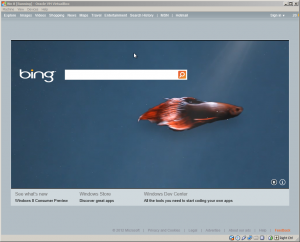Is Microsoft blocking Chrome and Firefox from native Windows RT a big deal?

Mozilla and Google, makers of the Firefox and Chrome Web browsers, don't have a problem with building new versions of their popular browsers for Windows 8's Metro interface. Firefox for Metro is on its way and so is Chrome. What they both object to though is that Microsoft's own Internet Explorer 10 and its successors will be the only browser that will run natively on Windows RT.
To catch up, Windows RT is the Windows 8 version for ARM-based tablets and, eventually, laptops. Windows RT has two user interfaces: Metro and very restricted Windows 7-style desktop that can only run Microsoft customized applications To be exact, Windows President Steven Sinofsky said that the Desktop experience on Windows on ARM, it will be limited to specially tailored "Office 15" versions of Word, Excel, PowerPoint and OneNote; the Windows File Explorer; Internet Explorer 10 and some operating system tools/components.
No problem though right? You'd still be able to run the Metro style Firefox and Chrome on Windows RT's Metro interface right? Well, not really, not well.
Windows 8 supports three kinds of applications: Metro, classic desktop, and Metro-style enabled desktop browsers (MEDB). Firefox and Chrome are coming out with MEDB versions of their applications for Windows 8. That means they'll "have full access to Win32 APIs for rendering HTML5 (DOCX format), including the ability to use multiple background processes, Just in Time (JIT) compiling, and other distinctly browser-related functionality (like background downloading of files." That's vital because to get a full 21st century Web browser experience you need all that legacy code.
Windows RT, however, doesn't support MEDB. There's also no Win32 in Windows RT Metro for non-Microsoft applications. In Windows on ARM tablets, your choices are pure Metro applications, with limited functionality, or Microsoft's own applications for the classic desktop, which can work with the Win32 application programming interfaces (API).
While Google, Mozilla or anyone else can write a pure Metro application for Windows on ARM they operate in a sandbox without access to the classic Win32 APIs. According to Asa Dotzler, Director of Firefox , "IE on ARM has access to win32 APIs--even when it's running in Metro mode, but no other Metro browser has that same access. Without that access, no other browser has a prayer of being competitive with IE."
He's pretty much right. This really isn't a surprise. If you'd been following Windows RT on ARM news you already knew it's as closed a system as iOS on Apple iPads. There's nothing remotely open about either one. Windows RT is also a limited subset of Windows. For example, Windows RT doesn't support Active Directory (AD).
Mozilla and Google aren't happy about this. They claim, with reason, that Microsoft is "restricting user choice and innovation." Google, on the other hand, lets you run non-Google browsers on Android such as Firefox and Opera.
What Microsoft is doing is remindful of the way that Microsoft illegally crushed Netscape as other competition. Eventually the Department of Justice ended up giving a Microsoft slap on the wrist in 1998. By dodging being broken up into separate companies, Microsoft was able to continue its domination of the desktop until the present day.
That was then. This is now. While Microsoft has clearly made Windows on ARM a closed shop to all competitors, Microsoft has almost no presence worth speaking of in tablets. It owned the PC world when it slapped down Netscape and other competitors.
Dotzler worries that "ARM (and Windows RT with it) will be migrating to laptop PCs and all-in-one PCs very quickly." ARM might very well become popular, I doubt Windows RT will grow in popularity with it though. Other operating systems, like Ubuntu and Fedora are already up and running on ARM-powered systems.
Windows RT and its restrictions? Sure, it's unfair to Google, Mozilla, Opera, and independent software vendors (ISV)s? Sure it is. But, so what? This is just going to be another reason why Windows 8 Metro will fail. IPads and Android tablets own the marketplace and the ARM tablet and desktop markets are still open for anyone. Let Microsoft release Windows RT with its limited software choices and no support for the vast majority of Windows Win32 applications. Customers and developers will punish Microsoft far more than any judge will.
Related Stories:
Mozilla and Google accuse Microsoft of unfair browser competition
Mozilla shows off a Metro style Firefox prototype for Windows 8
Google joins Windows 8 browser war with plans for Metro Chrome
